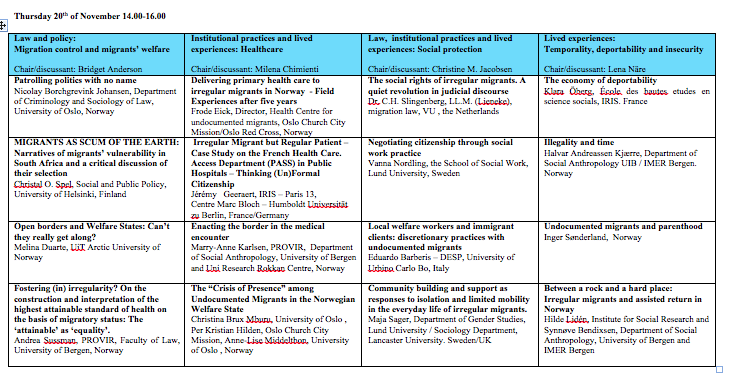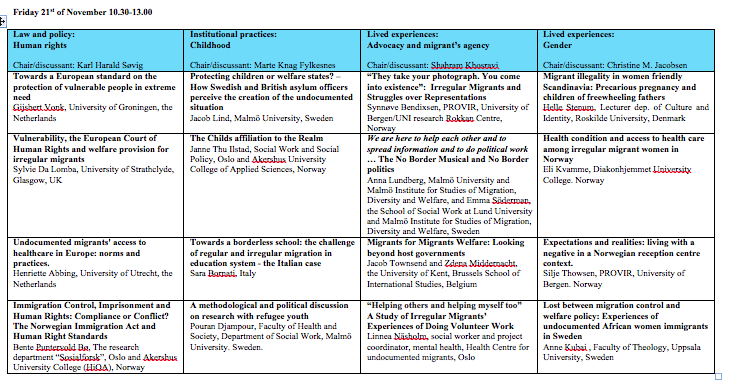Ida Tolgensbakk – Swedish migrants in Norwegian media and popular culture
In this seminar Ida Tolgensbakk will present some findings from her PhD research on young, Swedish labor migrants in Oslo. In everyday encounters in Norway, the young Swedes are identified as such primarily through linguistic characteristics, and not for instance skin color, phenotype, or dress. That is, they are audible rather than visible migrants. Tolgensbakk will discuss what kind of consequences this has on the lives of the young Swedes, as well as look into the related questions of how the young Swedes are presented in Norwegian media and popular culture.
Ida Tolgensbakk
Department of cultural studies and oriental languages, UiO. Ida Tolgensbakk has a master in folklore studies from 2005 (on national identity in the Faroe Islands). She worked three years at the Norwegian Institute of Local history, mainly focusing on migrant’s life stories. She is now studying young, Swedish labor migrants moving to Oslo. Her research is based on life story interviews, fieldwork on a Facebook group, and texts from popular culture and the media.
Read more here: http://www.hf.uio.no/ikos/english/people/aca/idatol/
Communicating Migration Seminar Series IMER Bergen spring and autumn 2014
The IMER seminar series for 2014 will cover how migration and ethnic relations are communicated in every-day encounters, in mass and social media, in politics and in teaching at the universities. Has the way people talk about migration and migrants in different social contexts changed over time, and in which ways has it changed? How does migration theory and research fit in with other topics and theories in the social sciences, and how do results from migration research inform public debate and policy development? Communicating migration will be discussed from various angles in our seminar series on international migration and ethnic relations during spring and autumn 2014. We welcome papers that touch upon this broad theme from different angles. Historical analyses of change over time in regard to politics and public debate, research foci and disciplinary concerns are specifically welcomed. The seminar series will end with a two-day conference in October/November 2014.
PROVIR closing conference: “Exceptional welfare: Dilemmas in/of irregular migration”
Wednesday 19th of November
Venue: Det Akademiske Kvarter
18.00-19.30: Letter to the king
Film by Hisham Zaman
Letter to the King portrays five people on a day trip from a refugee camp to Oslo, a welcome change in an otherwise monotonous life. But we soon realize that each and every one of them has an agenda for their trip. All five will make decisive choices on this day, as they discover happiness, humiliation, love or fulfill a long-awaited revenge. The five stories are tied together by a letter, written by eighty-three year old Mirza. Mirza wants to hand over the letter to the King personally.
19.30-21.00: Mediating irregular migration
Researchers, artists, authors, journalists and others contribute to the proliferation of images of the lives, and deaths, of those who migrate without proper authorization from the state. While stereotypical accounts of victims/criminals proliferate in mainstream media – (counter) representations that challenge such stereotyping also exist. The speakers in this panel discussion have all participated in producing and/or analysing images of irregular migration. Taking as their point of departure the film “Letter to the King”, they will discuss the poetics and politics of mediating irregular migration. What (im)possibilities does such mediation offer for current border struggles?
Plenary panel discussion with:
Mehmet Aktas, co-producer and scriptwriter, Letter to the king
Shahram Khosravi, Associate Professor of Social Anthropology, University of Stockholm
Synnøve N. Bendixsen, Post-doctoral fellow PROVIR and Department of Social Anthropology, University of Bergen
Film and panel discussion organized in cooperation with Studentersamfunnet i Bergen (http://samfunnet.sib.no/)
Thursday 20th of November
Venue: Faculty of Law, Magnus Lagabøtes plass 1, University of Bergen
09.30-10.00: Tea, coffee and registrations
10.00-10.15: Welcome address
10.15-11.45: Precarious inclusion: Provision of welfare to irregular migrants in Norway
Presentation of PROVIR research findings by
Christine M. Jacobsen, Karl Harald Søvig, Synnøve Bendixsen, Andrea Sussman and Marry-Anne Karlsen
11.45-12.00: Coffee break
12.00-13.00: Care Beyond Welfare?
Key note lecture by Miriam Ticktin, Associate Professor of Anthropology, The New School for Social Research and Eugene Lang College (US)
13.00-14.00: Lunch
14.00-16.00: Workshops
16.00-16.15: Coffee break
16.15-17.15: Wrongs, Rights and Regularization
Key note lecture by Linda Bosniak, Distinguished Professor of Law, Rutgers School of Law–Camden (US)
19.00: Conference dinner
Nøsteboden
Friday 21st of November
Venue: Faculty of Law, Magnus Lagabøtes plass 1, University of Bergen
09.15-10.15: Limiting Health Care as a Tool of Immigration Policy: Ethnographic Insights into Deservingness and Responses by Civil Society
Key note lecture by Heide Castañeda, Associate Professor and Graduate Director, Department of Anthropology, University of South Florida (US)
10.15-10.30: Coffee break
10.30-12.30: Workshops
12.30-13.30: Lunch
13.30-15.30: Excepted, excluded or precariously included? Dilemmas in/of irregular migration
Roundtable discussion by PROVIR research team and international partners:
Bridget Anderson, Professor of Migration and Citizenship and Deputy Director of Centre on Migration, Policy and Society (COMPAS), University of Oxford (UK)
Milena Chimienti, Professor, University of Applied Science Western Switzerland – Social Work, Haute Ecole Fribourgeoise de Travail Social (HETS) (Switzerland)
Henriette Abbing, (Emiratus) Professor of Health Law, University of Utrecht (the Netherlands)
Christine M. Jacobsen, Professor, PROVIR project leader and Director of Center for Women’s and Gender Research (SKOK), University of Bergen (Norway)
Karl Harald Søvig, Professor, Faculty of Law, University of Bergen (Norway)
Workshop Porgram:
Download workshop program here
Film and panel discussion on the dilemmas of mediating irregular migration
Wednesday 19th of November
Venue: Tegleverket, Det Akademiske Kvarter, Bergen
18.00-19.30: Letter to the king
Film by Hisham Zaman
Letter to the King portrays five people on a day trip from a refugee camp to Oslo, a welcome change in an otherwise monotonous life. But we soon realize that each and every one of them has an agenda for their trip. All five will make decisive choices on this day, as they discover happiness, humiliation, love or fulfill a long-awaited revenge. The five stories are tied together by a letter, written by eighty-three year old Mirza. Mirza wants to hand over the letter to the King personally.
19.30-21.00: Mediating irregular migration
Researchers, artists, authors, journalists and others contribute to the proliferation of images of the lives, and deaths, of those who migrate without proper authorization from the state. While stereotypical accounts of victims/criminals proliferate in mainstream media – (counter) representations that challenge such stereotyping also exist. The speakers in this panel discussion have all participated in producing and/or analysing images of irregular migration. Taking as their point of departure the film “Letter to the King”, they will discuss the poetics and politics of mediating irregular migration. What (im)possibilities does such mediation offer for current border struggles?
Plenary panel discussion with:
Mehmet Aktas, co-producer and scriptwriter, Letter to the king
Shahram Khosravi, Associate Professor of Social Anthropology, University of Stockholm
Synnøve N. Bendixsen, Post-doctoral fellow PROVIR and Department of Social Anthropology, University of Bergen
Film and panel discussion is organized by IMER Bergen in cooperation with Studentersamfunnet i Bergen (http://samfunnet.sib.no/) and is part of the PROVIR-project’s closing conference.
Precarious inclusion: Provision of welfare to irregular migrants in Norway
The IMER Bergen-project Provision of welfare to irregular migrants (PROVIR) will present its research findings at this open event.
PROVIR combined legal and anthropological approaches to investigate the complex relationship between law, institutional practice, and irregular migrants’ lived experience. The research project aimed to cast light on living conditions and access to welfare of irregularized migrants.
You can find more information about the project at PROVIRs website: http://rokkan.uni.no/sites/provir/
Date: November 20th
Time: 10.00 to 11.45
Venue: Auditorium 4, Faculty of Law, University of Bergen
Plural policing and the safety–security nexus in urban governance
Based on a study of policy frames in urban politics in Sweden, Malmö in particular, this article discusses the safety–security nexus in urban governance. It argues that perceived safety figures as an index of order and integration, and security becomes part and parcel of an expanded cohesion agenda which chain-links criminal justice, immigration control and civic integration. The expanded cohesion agenda in urban governance involves plural urban policing enabled by partnership agreements between the police and local authorities. The article demonstrates how force-based, pre-emptive crime-fighting is intertwined with preventative empowerment programmes; the ‘will to power’ is embedded in ‘the will to empower’. The preferred solution to social problems is extended force-based policing in combination with more police involvement in ‘social’ governance. It is argued that the expanded social cohesion agenda works to ‘criminalize’ specific subpopulations by replacing ‘social’ welfare politics with crime prevention programmes. Under an expanded cohesion agenda, crime prevention has less to do with preventing people from violating the law and more to do with securing the social order. Moreover, it is argued that security politics relates to a broader urban politics aimed at nurturing prosperous diversity considered to benefit the city as a whole, at the cost of problematic difference. In conclusion the article argues that urban security politics lends itself to old welfare state structures, even as responsibility for social crime prevention is devolved ‘downwards’ and distributed across and array of agencies. The social democratic legacy – the revised welfare state – seems to offer favorable conditions for plural policing of minority groups in the city.
 Randi Gressgård is professor at the Centre for Women’s and Gender Research (SKOK), and affiliated with the research unit International Migration and Ethnic Relations (IMER), University of Bergen. Her research interests include migration & minority studies, gender & sexuality studies and urban studies. Among her recent publications are Multicultural Dialogue: Dilemmas, Paradoxes, Conflicts (New York and Oxford: Berghahn Books, 2010/2012) and ‘The power of (re)attachment in urban strategy: Interrogating the framing of social sustainability in Malmö’ (Environment and Planning A 2014, vol. 46).
Randi Gressgård is professor at the Centre for Women’s and Gender Research (SKOK), and affiliated with the research unit International Migration and Ethnic Relations (IMER), University of Bergen. Her research interests include migration & minority studies, gender & sexuality studies and urban studies. Among her recent publications are Multicultural Dialogue: Dilemmas, Paradoxes, Conflicts (New York and Oxford: Berghahn Books, 2010/2012) and ‘The power of (re)attachment in urban strategy: Interrogating the framing of social sustainability in Malmö’ (Environment and Planning A 2014, vol. 46).
IMER Lunch: Astrid Ouahyb Sundsbø – Social mixing policies: What You Want and What You Get
In the public debate and contemporary social policies in Norway as well as in other countries, concentrations of “immigrants” in certain areas of a city are considered to be unfortunate and something which needs to be fought against (see i.e. Gakkestad 2003; Akerhaug 2012). It is anticipated that spatial concentrations of “immigrants” enforces the social isolation of “immigrants” and triggers criminal activities, among other aspects. This becomes very obvious when a “high percentage of immigrants” in an area serves as basis for referring to that area as a “ghetto” or “insecure” (see i.e. Sæter 2005; Vassenden: 2007; cf. Akerhaug 2012).
In this lunch seminar, the idea of social mixing, which is not just common in the general public debate but also a manifested major urban policy and planning goal (Sæter & Ruud 2005; Huse, Sæter & Aniksdal 2010; cf. Musterd 2005) will be discussed. By using some illustrations both from the academic debate as well as own empirical work, it is shown that it is necessary to be critical about this concept.
It is referred to literature arguing that there is a lack of empirical evidence showing that the residential segregation of “immigrants” has any effect at all, for instance on “integration” and crime (for instance Musterd 2005; Galster 2007; Lees 2008). Furthermore, it is discussed that the imagination of social mixing as an ideal way to tackle the “multicultural challenge” might be founded on a highly problematic understanding of “immigrants“ and their norms and values as inherently “bad” (cf. Eriksen 1996: 51). This is shown by drawing on statements from interviews with members from the majority population residing in Oslo.
Astrid Ouahyb Sundsbø
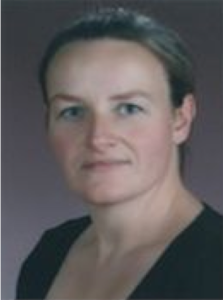 Astrid Ouahyb Sundsbø (PhD) is a postdoctoral research fellow at the Georg-Simmel Center for Metropolitan Studies in Berlin. She holds a doctoral degree in sociology from the Humboldt-University of Berlin (2012). From 2012-2014 she worked as a postdoctoral researcher at the Center for a Sustainable University at the University of Hamburg. Her main fields of research compromise: Social inequality, residential segregation in cities, migration and interethnic relations. Her most recent publication is Grenzziehungen in der Stadt. Ethnische Kategorien und die Wahrnehmung und Bewertung von Wohnorten (Springer VS, 2014) where it is discussed whether ethnic boundary making on the side of the majority population could be a possible explanation for the residential concentration of immigrants in Berlin and Oslo.
Astrid Ouahyb Sundsbø (PhD) is a postdoctoral research fellow at the Georg-Simmel Center for Metropolitan Studies in Berlin. She holds a doctoral degree in sociology from the Humboldt-University of Berlin (2012). From 2012-2014 she worked as a postdoctoral researcher at the Center for a Sustainable University at the University of Hamburg. Her main fields of research compromise: Social inequality, residential segregation in cities, migration and interethnic relations. Her most recent publication is Grenzziehungen in der Stadt. Ethnische Kategorien und die Wahrnehmung und Bewertung von Wohnorten (Springer VS, 2014) where it is discussed whether ethnic boundary making on the side of the majority population could be a possible explanation for the residential concentration of immigrants in Berlin and Oslo.
Lisa Kings: Contesting urban management regimes: The rise of urban justice movements in Sweden
Addressing segregation, racism and welfare transformation, a new form of grassroots mobilization among young adults is emerging in the peripheries of Swedish cities. The common denominator is that they define themselves as urban justice movements– with place as the social ground for mobilization. Witha Gramscian perspective, the article analysis the rise of urban justice movements in relation to contemporary urban policies in Sweden. We argue that Swedish urban policies during the last 20 years have created a hegemonic urban management regime underpinned by area based programs with a focus on network steering and new forms of partnership between civil society and public institutions. The emergence of urban justice movements is here understood in relation to firsthand negative experience of– and later active revulsion from– having participated in activities and issues related to the urban management regime. These experiences and the later proclaimed autonomy of the movements have been a key condition for the beginning of a broader struggle that merges local rootedness with wider structural-institutional conditionality. (co-authored by Aleksandra Ålund (Linköping University) and Nazem Tahvilzadeh (KTH Royal Institute of Technology).
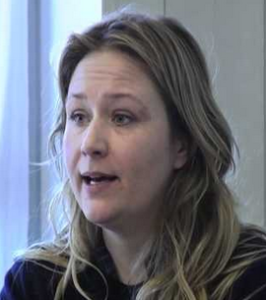 LISA KINGS holds a PhD in Sociology at Søderthorn University College. Her researh interests are urban theory, social movements, inequality and everyday life. (lisa.kings@sh.se)
LISA KINGS holds a PhD in Sociology at Søderthorn University College. Her researh interests are urban theory, social movements, inequality and everyday life. (lisa.kings@sh.se)
Vanja Lozic: Problematizing parents, governing troubled youth
The paperfocuses on current debate on troubled youth, living in socio-economically deprived suburbs in Sweden, and particularly discourses on problems of alienation, crime, arson and anti-social behaviour among youth. In the paper, interviews with the representatives of different organisations involved in managing the youth problem are analysed. One recurring theme in the interviews is problem discourses representing the parent as a problem. Departing from Foucault´s understanding of governmentality and the formation of subjectivity, we analyse the construction of problems, problematization, and conceivable solutions, as depicted by the interviewees. The problematizations recurring in the interviews are the deficiency of urban space, dysfunctional family relations and parents as being passive and culturally different. On the basis of such problematizations the interviewees propose solutions in various ways fostering the parents to become responsible and active subjects, who have internalised current norms and values. Other central solutions emerging in the interviews are the development of various forms of communicative skills as well as a range of pre-emptive measures targeting the parents. An important conclusion in the paper is that this way of developing possible solutions to the problems of suburban youth tends to focus on the transformation of individual parents, while structural dimensions get out of focus. What appears is a desire to foster parents and thus to produce a certain kind of subject, namely an active, responsible and cooperative individual, involved in the local community. (The paper is co-authored with Magnus Dahlstedt.)
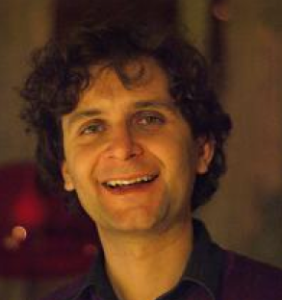 Vanja Lozic holds a PhD in history and issenior lecturer in Science of Education at Kristianstad University, Sweden. His research deals with issues in education from the perspectives of ethnicity, multiculturalism, gender, disability, youth cultures and work integrated learning. At present, he is participating in a research project “Cooperation, education and inclusion in multi-ethnic urban settings”, which concerns the connections between institutional restructuring, youth resistance and strategies for social inclusion. The aim is to investigate the measures for social inclusion within schools, local institutions and civil society actors in socioeconomically deprived areas of large cities in Sweden
Vanja Lozic holds a PhD in history and issenior lecturer in Science of Education at Kristianstad University, Sweden. His research deals with issues in education from the perspectives of ethnicity, multiculturalism, gender, disability, youth cultures and work integrated learning. At present, he is participating in a research project “Cooperation, education and inclusion in multi-ethnic urban settings”, which concerns the connections between institutional restructuring, youth resistance and strategies for social inclusion. The aim is to investigate the measures for social inclusion within schools, local institutions and civil society actors in socioeconomically deprived areas of large cities in Sweden

